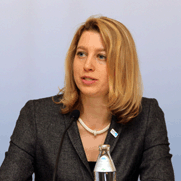
Corey Hinderstein
Vice President, International Fuel Cycle Strategies
On Friday July 13, 2012, the Nuclear Threat Initiative (NTI), Japan Atomic Energy Agency (JAEA), and the U.S. National Nuclear Security Administration (NNSA) sponsored an event focusing on nuclear security in Asia. The panel analyzed how national, bilateral and international approaches are being pursued to increase nuclear security.
The panel presentations and discussion was chaired by Corey Hinderstein, NTI’s vice president for international programs. The speakers included:
Ms. Hinderstein introduced the discussion noting that “global threats require global solutions.” She highlighted how the 2010 Nuclear Security Summit and Fukushima disaster resulted in cooperation and leadership by the international community to address nuclear security issues. Panelists focused their speeches on the partnership between the US and Japan, as well as Japan’s own efforts to improve nuclear security in East Asia.
Masao Senzaki, Director of the Integrated Support Center for Nuclear Nonproliferation and Nuclear Security
Mr. Senzaki emphasized the importance of the partnership between the United States and Japan through the Tomodachi Initiative. He stressed the significance of investing in future US-Japan security engagement and expressed gratitude for US support after the Fukushima disaster. Mr. Senzaki also discussed Japan’s national statement at the Nuclear Security Summit in 2010 and the creation of a center of excellence.
He outlined three major lessons learned from the Fukushima accident:
He also noted that Japan is in the process of developing a new nuclear regulatory structure. Japan is currently reviewing its policy toward nuclear power production and assessing multiple future options.
James Conner, foreign affairs specialist, U.S. Department of Energy, National Nuclear Security Administration (NNSA)
Mr. Connor discussed NNSA programs conducted in cooperation with other countries, noting that these programs are a key part of President Obama’s plan to improve nuclear security worldwide.
The International Nuclear Safeguards Engagement Program collaborates with global partners, such as Japan, to strengthen international safeguards. The International Nuclear Security Program engages international partners, providing courses and training in nuclear security. Conner emphasized NNSA’s support for Japan’s Center of Excellence and its training curriculum, describing the Center’s security training as “leading the world.” He also noted the value of joint outreach by the United States and Japan to third countries.
Yosuke Naoi, Japan Atomic Energy Agency
Mr. Naoi described the efforts of Japan’s “Center of Excellence,” the Integrated Support Center for Nuclear Nonproliferation and Nuclear Security (ISCN) to enhance global nuclear security through human resource, technology, and infrastructure development.
The Center’s success is tied to its global connections with the United States, the International Atomic Energy Agency and Forum for Nuclear Cooperation in Asia. The Center has engaged Vietnam, Malaysia, Mongolia, Kazakhstan, Thailand and Indonesia, among other countries, in cooperative measures, including:
Mr. Naoi emphasized that Japanese-US cooperation must continue in order to enhance nonproliferation and security in the Asian region.
Kazuko Hamada of the Japan Atomic Energy Agency
Dr. Hamada’s presentation focused on cooperative work between JAEA and Vietnam. She emphasized Japan’s commitment to nuclear disarmament, to proactively promote the peaceful use of nuclear energy, and to enhance nuclear nonproliferation regimes, highlighting her agency’s role in capacity building. JAEA uses a “train the trainer” approach to ensure sustainability and independence within the partner nation, noting that Vietnam should be able to develop its own capacity building program once the workshops are complete.
She stated that multilateral international initiatives complement bilateral ones and both are important to increase knowledge sharing, to extend outreach, and to develop optimal mechanisms for effectively and efficiently enhancing nuclear security. JAEA can achieve further success in nonproliferation and security in Asia and beyond through cooperation with the IAEA, the United States and the European Commission’s Joint Research Center.
Summary prepared by Katherine Strickland, NTI intern and student at Washington and Lee University
